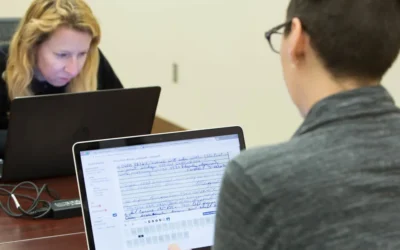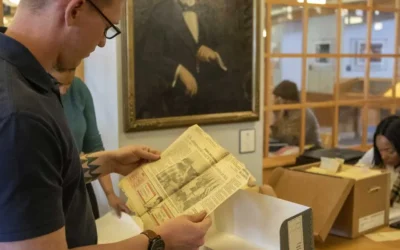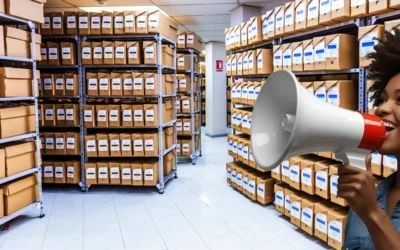Acquisition and Appraisal for More Representative Archival Collections
Margot Note
Archivists are tasked with making informed selections of primary sources to provide the future with a representation of the human experience. They should build their collections by looking at the bigger picture of history and collecting records that will most accurately present the past to the future.
The process will never be purely objective. However, archival acquisition and appraisal policies can be thoughtful and strategic, using limited time, space, and resources to maximize the collection’s usefulness.
Acquisition
Some archives perceive that their primary duty is to be the custodian of records and abdicate the process of documenting the world to others. If this responsibility is shifted to historians, for example, archival holdings risk reflecting narrow research interests rather than the broad spectrum of human experience. Archivists must be able to work locally between archives as well as nationally to develop guidelines and strategies for archival collecting.
Archivists must employ acquisition policies that are interdisciplinary, cooperative, and definitive. Confronting the problem of acquisition development on an individual basis or continuing to amass documentation on a topic while deferring tough decisions, is no longer a sufficient response. To collect historical evidence, archivists must create strategies to build collections thoughtfully, rather than being passive receivers of files of limited value.
Documentation Strategy
Archivists should also build collections cooperatively while minimizing duplication. They can adapt collection management strategies from libraries by building alliances across repositories. Documentation strategy is a multi-institutional, cooperative analysis that combines many archives’ appraisal activities to document main themes and events. The documentation strategy integrates official government and other institutional records with personal manuscripts and visual media, as well as published information and oral histories. Using documentation strategies requires the analysis of the topic’s history and scope, so that adequate records can be gathered. However, the documentation strategy may have limited value for institutional or corporate archives because they cannot share records with other institutions.
Once an acquisition strategy has been formulated, records must be gathered. The systematic process of acquiring manuscripts requires data-gathering, preliminary contact, appraisal, negotiation, transport and receiving, and follow-up. With the documentation strategy in mind, an archivist fills in gaps or strengthens previously acquired collections. Like historians, archivists should strive to develop empathy for the past and a sense of the relationships which once existed.
Appraisal
All archival processes hinge upon appraisal since the decisions made during appraisal will affect future costs and labor at the repository. Administrating modern records has several challenges, such as bulk, redundancy, and impermanence. The growing preservation demands of modern records coupled with the sacrifices made by pursuing less effective alternatives require archivists to ensure optimal use is made of scarce resources through effective planning and evaluation of archival options.
Archivist Gerald Ham cites six collections management elements: interinstitutional cooperation, documented application of appraisal procedures, de-accessioning, pre-archival control, record-volume reduction, and analysis and planning. While by no means all-inclusive, these elements will, if applied judiciously, rationalize and streamline archival acquisition and appraisal. Of course, archivists need to create practices that work for their repositories, rather than following past practices blindly.
During appraisal, archivists function as mediators to find ways to protect the evidence of human action. Archivists leave questions of the meaning of information communicated by records to posterity to investigate. Archivists are, therefore, not processors of information, but keepers and protectors of the integrity of evidence. The purpose of the archivist and their institutions is to preserve the integrity of historical records as reliable and trustworthy evidence of the actions from which they originated.
Archivists also function as mediators between creators and users. They apply appraisal policies formed by committees so that an individual’s viewpoint cannot skew holdings. They act not as interpreters of society because they are responsible to future generations to let them judge society by the documents it produced. Appraisal uses a methodology that reflects current best practices and is appropriate for the repository to preserve historical documentation.
An Active Role
Archivists are not passive receivers and protectors of history; they actively preserve primary sources for research. Although they may not be interpreting these sources, they provide the materials in which histories are written. If all documents arise from memorializing something, they are history in their own right. To decide to preserve them, or destroy them, affects the historical record of the future.
Archivists need to take a more active role in shaping the archival record of the future, creating a more useful and representative documentary heritage. This requires archivists and associated professionals to take leadership roles in selecting and acquiring records, which calls for decision-making and strategy skills. Factors such as the bulk of records, missing data, vulnerable records, and technology have created an information environment in which archivists may have to make hard decisions.
Asking Tough Questions
As they conduct their work, archivists should ask themselves if there are opportunities to create alliances with other archives collecting similar material. How can they lead their repositories to be knowledge creators, rather than containers? In asking themselves those questions, they can begin to empower themselves as helping to shape a more representative and accurate history of all people.
Margot Note
Margot Note, archivist, consultant, and author is a guest blogger for Lucidea, provider of ArchivEra, archival collections management software for today’s challenges and tomorrow’s opportunities. Read more of Margot’s posts here.
Similar Posts
Collaborative Archival Relationships
Collaborative projects are instrumental in showcasing how archival collections can benefit various organizational departments.
Informational, Evidential, and Intrinsic Values within Archives
Archives provide authentic, reliable information and hold values that reflect their functions and uses; informational, evidential, and intrinsic.
A Sustainable Archives
Archivists prioritize sustainable practices and policies, rooting their work in ethics of care, often preferring digital processing and preservation
Archival Branding and PR Strategies
Archivists who adopt branding and PR strategies both safeguard historical treasures and contribute to their organizations’ evolution.




Leave a Comment
Comments are reviewed and must adhere to our comments policy.
0 Comments